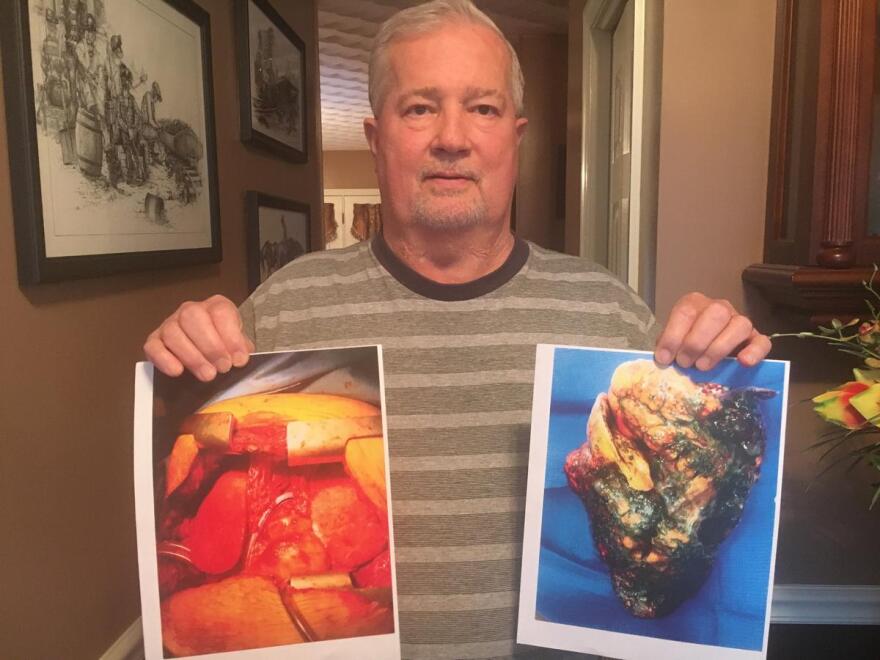Across Appalachia, thousands of coal miners have suffered from black lung disease. In the 1960s, miners organized a movement to end the chronic condition. They convinced Congress to pass new laws that were supposed to make black lung a thing of the past. Today, conditions underground have changed, and the disease has come roaring back. For this episode of Inside Appalachia, we are taking another listen to this show which aired in the spring.
Black lung, also known as coal workers' pneumoconiosis, is caused by long-term exposure to coal dust in the process of mining. Inhaled coal dust builds up in the lungs, causing inflammation, and eventually tissue death. Many sufferers describe a feeling of drowning because their lungs are unable to work properly and they can’t take a breath.
A 2013 investigation by the Center for Public Integrity into the misconceptions surrounding the disease and the regulatory maze associated with applying and being approved for black lung benefits revealed a system in which coal miners are fighting an unfair battle for disability payments and medical care.
CPI found that the industries’ go-to law firms employed a strategy of withholding evidence that proved miners had black lung. The investigation also found that some doctors rarely, and sometimes never, diagnosed patients with the disease.
In 2016, NPR's Howard Berkes reported a new generation of Appalachian coal miners have a severe form of black lung.
Despite mounting evidence, and a stream of dire warnings, federal regulators and mining companies failed to protect coal miners from toxic dust. NPR and the PBS series "Frontline" spent more than a year investigating the new surge of black lung disease in central Appalachia. NPR obtained documents and data that show federal mine safety officials had evidence of the danger more than 20 years ago, but never addressed it.
Now at least 2,000 miners are dying from an epidemic of severe black lung linked to that toxic dust. NPR's Howard Berkes traveled across Appalachia to meet many of those miners for a report that aired on "Frontline" earlier this year. In this episode we’ll listen to his report, which originally aired in December 2018 on All Things Considered.
Robert Bailey's Final Words of Advice to Fellow Miners

We’ll also listen to a story we’ve been following for five years. Since 2014, Inside Appalachia’s host Jessica Lilly has been collecting interviews with Robert Bailey, who worked in the coal mines for 36 years until he was diagnosed with advanced black lung. In the last few years, he became a reluctant advocate for miners’ rights — reluctant only because he didn’t wish to draw attention to himself. After his diagnosis, he fought with his former employer's insurance company to receive a lung transplant. Ultimately, he prevailed, but it only added a few years to his life.
"I know a lot of them does a lot of things for the money, and they're offered a lot of money to meet certain goals. But you can meet a goal today that will take you out of this world tomorrow." — Robert Bailey
Bailey died not long after Jessica’s final interview with him. He died of cancer that was likely caused in part to the medicine he had to take after receiving his double lung transplant. Still, he said he was grateful that he ended up receiving that medical care because it gave him more time with his family.
This episode of Inside Appalachia is in honor of Mr. Bailey and the thousands of miners who suffer from Black Lung disease.
Federal Program Running Out of Funds
The clock is ticking for miners with black lung, just as time is running out for a federal fund that helps miners who struggle with the deadly disease.
The Black Lung Disability Trust Fund could be $15 billion dollars in debt by 2050 if the rate in which coal companies are taxed doesn't change. The fund pays benefits to miners when coal companies cannot, including when they file for bankruptcy. It's funded by taxes paid on coal by mining companies, but at the end of 2018, a long-standing tax rate increase on coal expired, putting the fund at risk.
That could mean reduced benefits for miners suffering from black lung and it might make it harder for others to qualify for benefits. It’s not just the miners who suffer because of the disease their widows are often left to pick up the fight for benefits.
For more information about black lung in Appalachia, and some treatment options that are available for this disease, check out these stories:
- Still Fighting: These Widows’ Stories Show Larger Effects of Black Lung Epidemic
- Amid Black Lung Surge Pulmonary Rehab Brings Hope To Disabled Miners
- West Virginia Coal Miners Rally For Black Lung Legislation
- Black Lung, Red Ink: Residents Press McConnell As Deadline Looms For Black Lung Fund
- Data Dives And Shoe Leather: How NPR’s Howard Berkes Investigated Appalachia’s Black Lung Epidemic
- Coal’s Deadly Dust
We had help producing Inside Appalachia this week from NPR, PBS "Frontline," and the Ohio Valley ReSource, which is supported by the Corporation for Public Broadcasting and West Virginia Public Broadcasting.
Loading...
Music in today’s show was provided by Darlingside, Dinosaur Burps, Adam Coxand Stan Bumgardner, Michael Howard, Alan Cathead Johnston, Stacy Grubb,and Ben Townsend.
Roxy Todd is our producer. Eric Douglas is our associate producer. Our executive producer is Jesse Wright. Brittany Patterson edited our show this week. Our audio mixer is Patrick Stephens. You can find us online on Twitter @InAppalachia.



